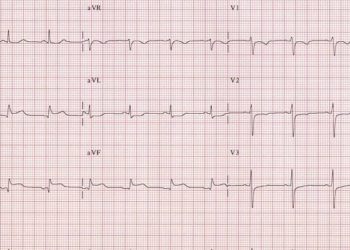Intensive systolic blood pressure management may reduce hypertension-mediated retinal microvascular damage in patients with high cardiovascular risk
1. Intensive systolic blood pressure (SBP) management reduces hypertension-mediated retinal microvascular damage in populations with high cardiovascular risk
Evidence Rating Level: 1 (Excellent)
Hypertension affects the retinal microvasculature by inducing a spectrum of structural and functional changes collectively termed hypertensive retinopathy. Antihypertensive treatment has been shown to slow the progression of hypertensive retinopathy. However, it is unclear if intensive treatment targeting SBP provides additional benefit compared with standard treatment targeting SBP. This multicentre, open-label, randomized controlled trial allocated 2,518 patients (mean age ± SD, 62.7 ± 6.4; 37.8% female) who were at least 50 years of age, had a SBP 130-180 mm Hg, and had an increased cardiovascular risk (defined as having established cardiovascular disease or at least 2 major cardiovascular risk factors) to either intensive treatment (SBP target <120 mm Hg) or standard treatment (SBP target <140 mm Hg) in a 1:1 ratio. Investigators adjusted participants’ antihypertensive medications based on pre-specified algorithms. After 3 years, patients in the intensive arm had significantly increased arteriolar calibre, as demonstrated by a higher arteriole-venule ratio (β = 0.16; 95% CI: 0.05-0.28; P = 0.005). This effect was consistently observed across subgroups. Intensive arm patients also showed significantly increased arteriolar complexity (β = 0.19; 95% CI: 0.08-0.30; P = 0.001) and arteriolar density (β = 0.17; 95% CI: 0.07-0.28; P = 0.002). This study suggests intensive blood pressure management reduces hypertension-mediated retinal microvasculature damage in populations with high cardiovascular risk. These findings contribute to emerging evidence that intensive blood pressure management may be beneficial compared to standard management in certain populations.
Click here to read this study in The Journal of the American College of Cardiology
Image: PD
©2025 2 Minute Medicine, Inc. All rights reserved. No works may be reproduced without expressed written consent from 2 Minute Medicine, Inc. Inquire about licensing here. No article should be construed as medical advice and is not intended as such by the authors or by 2 Minute Medicine, Inc.




![Novel biodegradable sirolimus-eluting stents non-inferior to durable everolimus-eluting stents [BIOSCIENCE trial]](https://www.2minutemedicine.com/wp-content/uploads/2014/09/Taxus_stent_FDA-e1607803635904-75x75.jpg)



